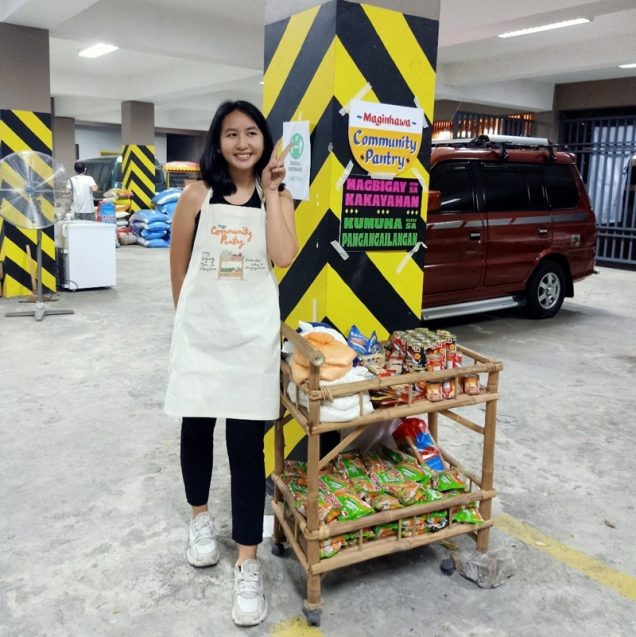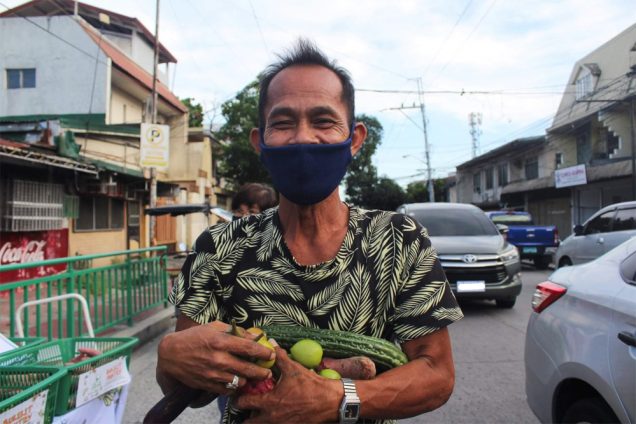Despite criticism: Community pantries flourish
Despite criticism: Community pantries flourish

Ana Patricia Non at Maginhawa Comunity Pantry’s new location standing next to the now famous cart.
Photo: Community Pantry PH Facebook page
“I’m grateful to the Filipinos who aren’t in the Philippines because they’ve been a huge help and they understand our situation” – Ana Patricia Non, Maginhawa Community Pantry
By Irish Mae Silvestre
The Philippine Reporter
They’re tables overflowing with canned goods and vegetables. Some are more mobile: people using carts or bikes seeking to bring food to those in need. At times their offerings are abundant, at others they’re sparse. But no matter their scale, these community pantries all share the same principle: take what you need, give what you can.
The phenomenon began just a few weeks ago when Ana Patricia Non started the Maginhawa Community Pantry with the now iconic bamboo cart full of produce and grocery items. Non, who prefers to go by her nickname Patreng, has since become a household name despite her initial reservations about being in the spotlight.
“I was really embarrassed because I don’t like seeing myself in the media or taking pictures,” she said during an online event by the Malaya Movement. “But I thought, at the end of the day, it’s not about me – it’s about food security.”
As of press time, Non confirmed that there were 1,078 community pantries across the Philippines.
“I wasn’t expecting it,” said Non during an interview with Radyo Migrante. “Why can people relate? It’s because there’s a growing need. It’s sad that the lines are long no matter where [the pantries are] – Manila, Baguio, Aklan, Davao. There’s nowhere where the lines aren’t long.”
She added that people wouldn’t line up in the extreme heat if they weren’t truly in need.
“It’s sad because people are exposed but it’s also a happy experience because there are lots of people and people are empowered and taking action to help each other,” she said. “It builds a sense of unity because it doesn’t choose between economic class or religion.”

A man at the Bulilit Pantry in Barangay
Bagumbuhay, Project 4, Quezon City.
Photo: Task Force Children of the Storm (TFCOS)
A Learning Curve
The community pantry has come a long way since its inception with a more secure location nearby. Non said that they receive between four to eight tonnes of vegetables every day. They’ve partnered with existing pantries and are working to create distribution hubs in places like Davao and Cebu so other pantries can continue their work.
She said that, on average, each pantry serves 300 people per day, which means that 200,000 people and their families have something to eat for that day.
As a business owner herself with a struggling furniture business she understands the importance of supporting and giving dignity to small business owners. For example, she said she buys street vendors’ entire wares, such as empanadas, fish balls or taho, as mirienda (snacks) for volunteers. They also work with farmers and fishermen and buy their products at a fair price.
“We’re open to constructive criticism so there are big changes every day,” said Non. Pantries now follow the same operating hours and close in the afternoons to allow seniors and pregnant women to go home and cook, while volunteers rest and pack food items.
She admitted that she was scared after being “red tagged” and has had to take extra precautions but has received a lot of support, including from Quezon City Mayor Joy Belmonte.
Julie Jamora of the Malaya Movement, said, “It’s kind of an all-time low for the Philippine government to target and harass community members like Patreng who are really filling in the gaps of what the government should really be providing for our kababayan in the Philippines amidst the pandemic.”
Non said that she takes her and her volunteers’ safety seriously. “I used to just take a tricycle to the pantry now I take a car,” said Non. “It’s still not that secure. While there’s a long line and people waiting, I’m still safe because people won’t let anything happen to me.”
She said that while they’ve received a lot in donations, it’s still “spare change compared to the missing funds and budget for the government.”
“I’ll release a transparency report and I’ll do an audit,” said Non. “But they have such high expectations from a private citizen when we know even the government officials haven’t released their own SALN. I said, sure, I’ll give it to them, but it should be done along with the people who still haven’t released this information.”
As for people using pantries to promote a political candidate, she said, “Let’s not do that. We can’t sustain the pantry if that’s our agenda because it’s about the community and helping each other. We have to go back to our basic goals.”
A Message to OFWs
Non’s sister, Pauline Jenny Non, is based in Washington D.C. and continues to help Non from afar. As a result, Non said she understands how disheartening it must be for Filipinos abroad to see the killings, hunger and vaccine shortage in the Philippines. She said that no matter how small a solution, she hopes that the community pantries can help people empower each other.
“I’m grateful to the Filipinos who aren’t in the Philippines because they’ve been a huge help and they understand our situation,” she said.
As for the future of community pantries, she said that her vision is to normalize love, compassion, kindness and giving.
“My goal is to have a community pantry in every street corner because sometimes we Filipinos, we cook too much rice or buy too many groceries,” she said. “If you have something extra, it will always help someone in need. At the end of the day, it won’t solve poverty or hunger. Pang tawid gutom lang (It’s just to fill the stomach) while we wait for government aid.
—————————–
 Irish Mae Silvestre is a Toronto-based journalist who has worked at magazines in Dubai, Chicago and New York. She covers news, lifestyle and entertainment. She studied journalism at Rutgers University, New Jersey and earned her master’s degree in journalism at DePaul University, Chicago. You can follow her on Twitter @irishmae101
Irish Mae Silvestre is a Toronto-based journalist who has worked at magazines in Dubai, Chicago and New York. She covers news, lifestyle and entertainment. She studied journalism at Rutgers University, New Jersey and earned her master’s degree in journalism at DePaul University, Chicago. You can follow her on Twitter @irishmae101
Comments (0)